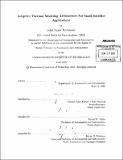Adaptive thermal modeling architecture for small satellite applications
Author(s)
Richmond, John Anger
DownloadFull printable version (22.74Mb)
Other Contributors
Massachusetts Institute of Technology. Dept. of Aeronautics and Astronautics.
Advisor
John Keesee and David W. Miller.
Terms of use
Metadata
Show full item recordAbstract
The United States Air Force and commercial aerospace industry recognize the importance of moving towards smaller, better, and cheaper spacecraft to support the nation's increasing dependence on space-based technologies. Whether large or small, all spacecraft will require the same basic bus systems and environmental protection, simply scaled to fit the mission. The varying thermal environment in space is particularly important to spacecraft design and operation because of its affect on hardware performance and survivability. The Adaptive Thermal Modeling Architecture (ATMA) discussed in this thesis is meant to bridge the gap between the commercially available thermal modeling tools used for larger, more expensive satellites, and the low-fidelity algorithms and techniques used for simple first order analysis. The ATMA consists of the MATLAB based Adaptive Thermal Modeling Tool (ATMT) and its user's manual, as well as the process by which an inexperienced engineer can quickly and accurately perform on-orbit thermal trades studies for a range of space applications. The ATMA tools and techniques have been validated with an industry standard thermal modeling program (Thermal Desktop) and correlated to thermal test data taken from MIT's CASTOR nanosatellite. The concepts derived and evaluated within ATMA can be extended to a variety of aerospace modeling applications. The ATMT program and modeling architecture are currently being utilized by members of MIT's Space Engineering Academy (SEA) and undergraduate satellite team as well as the U.S. Air Force Academy's FalconSAT-6 program.
Description
Thesis (S.M.)--Massachusetts Institute of Technology, Dept. of Aeronautics and Astronautics, 2010. Cataloged from PDF version of thesis. Includes bibliographical references (p. 189-190).
Date issued
2010Department
Massachusetts Institute of Technology. Department of Aeronautics and AstronauticsPublisher
Massachusetts Institute of Technology
Keywords
Aeronautics and Astronautics.